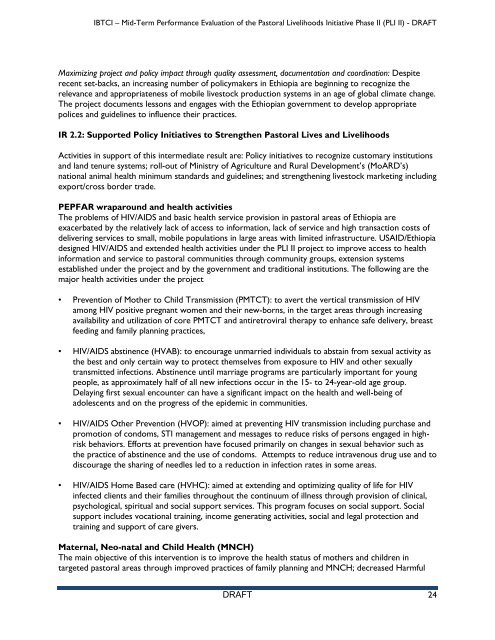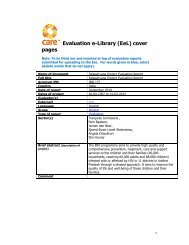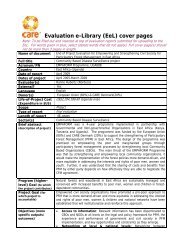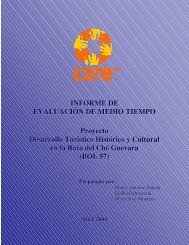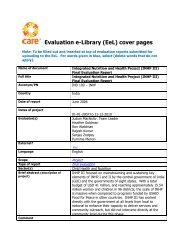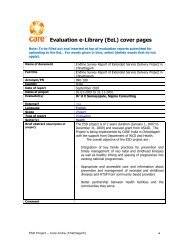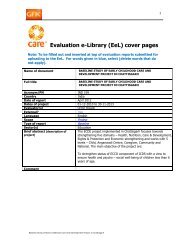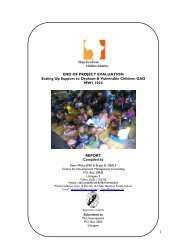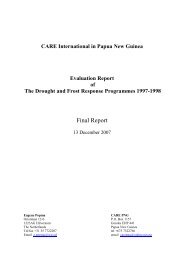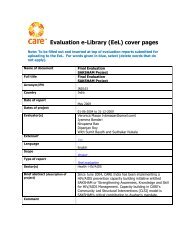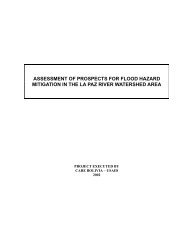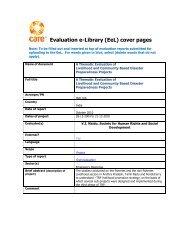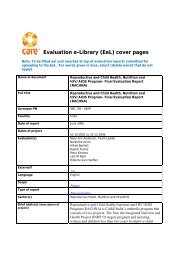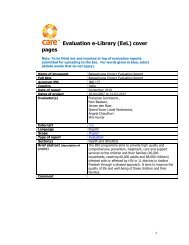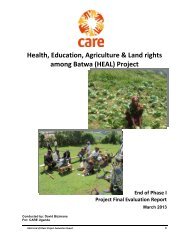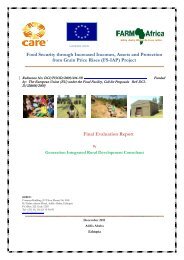Mid Term EVALUATION PLI II project - CARE International's ...
Mid Term EVALUATION PLI II project - CARE International's ...
Mid Term EVALUATION PLI II project - CARE International's ...
You also want an ePaper? Increase the reach of your titles
YUMPU automatically turns print PDFs into web optimized ePapers that Google loves.
IBTCI – <strong>Mid</strong>-<strong>Term</strong> Performance Evaluation of the Pastoral Livelihoods Initiative Phase <strong>II</strong> (<strong>PLI</strong> <strong>II</strong>) - DRAFT<br />
Maximizing <strong>project</strong> and policy impact through quality assessment, documentation and coordination: Despite<br />
recent set-backs, an increasing number of policymakers in Ethiopia are beginning to recognize the<br />
relevance and appropriateness of mobile livestock production systems in an age of global climate change.<br />
The <strong>project</strong> documents lessons and engages with the Ethiopian government to develop appropriate<br />
polices and guidelines to influence their practices.<br />
IR 2.2: Supported Policy Initiatives to Strengthen Pastoral Lives and Livelihoods<br />
Activities in support of this intermediate result are: Policy initiatives to recognize customary institutions<br />
and land tenure systems; roll-out of Ministry of Agriculture and Rural Development’s (MoARD’s)<br />
national animal health minimum standards and guidelines; and strengthening livestock marketing including<br />
export/cross border trade.<br />
PEPFAR wraparound and health activities<br />
The problems of HIV/AIDS and basic health service provision in pastoral areas of Ethiopia are<br />
exacerbated by the relatively lack of access to information, lack of service and high transaction costs of<br />
delivering services to small, mobile populations in large areas with limited infrastructure. USAID/Ethiopia<br />
designed HIV/AIDS and extended health activities under the <strong>PLI</strong> <strong>II</strong> <strong>project</strong> to improve access to health<br />
information and service to pastoral communities through community groups, extension systems<br />
established under the <strong>project</strong> and by the government and traditional institutions. The following are the<br />
major health activities under the <strong>project</strong><br />
• Prevention of Mother to Child Transmission (PMTCT): to avert the vertical transmission of HIV<br />
among HIV positive pregnant women and their new-borns, in the target areas through increasing<br />
availability and utilization of core PMTCT and antiretroviral therapy to enhance safe delivery, breast<br />
feeding and family planning practices,<br />
• HIV/AIDS abstinence (HVAB): to encourage unmarried individuals to abstain from sexual activity as<br />
the best and only certain way to protect themselves from exposure to HIV and other sexually<br />
transmitted infections. Abstinence until marriage programs are particularly important for young<br />
people, as approximately half of all new infections occur in the 15- to 24-year-old age group.<br />
Delaying first sexual encounter can have a significant impact on the health and well-being of<br />
adolescents and on the progress of the epidemic in communities.<br />
• HIV/AIDS Other Prevention (HVOP): aimed at preventing HIV transmission including purchase and<br />
promotion of condoms, STI management and messages to reduce risks of persons engaged in highrisk<br />
behaviors. Efforts at prevention have focused primarily on changes in sexual behavior such as<br />
the practice of abstinence and the use of condoms. Attempts to reduce intravenous drug use and to<br />
discourage the sharing of needles led to a reduction in infection rates in some areas.<br />
• HIV/AIDS Home Based care (HVHC): aimed at extending and optimizing quality of life for HIV<br />
infected clients and their families throughout the continuum of illness through provision of clinical,<br />
psychological, spiritual and social support services. This program focuses on social support. Social<br />
support includes vocational training, income generating activities, social and legal protection and<br />
training and support of care givers.<br />
Maternal, Neo-natal and Child Health (MNCH)<br />
The main objective of this intervention is to improve the health status of mothers and children in<br />
targeted pastoral areas through improved practices of family planning and MNCH; decreased Harmful<br />
DRAFT 24


